
Sponsored article
An oil cooler is an essential component for optimizing your engine’s efficiency and longevity. By managing and regulating the engine’s oil temperature, it plays a crucial role in maintaining optimal performance, especially under strenuous conditions. Understanding how this device works and its impact on engine health can save you time and money in the long run, ensuring that your vehicle runs smoothly while avoiding costly repairs. Let’s explore the specifics of how an oil cooler contributes to engine efficiency.
In the intricate world of automotive maintenance, the oil cooler function becomes a pivotal aspect of efficient engine thermal management. An oil cooler serves as a crucial component in regulating engine temperature by dissipating excess heat from the engine oil. This process is vital because when an engine operates, it generates a significant amount of heat, and if this heat isn’t properly managed, it could lead to overheating and subsequent engine damage. By deploying an engine oil cooler heat exchanger, excess thermal energy is transferred away from the oil, maintaining its integrity and ensuring that it can continue to lubricate engine components effectively, thus preserving the engine’s lifespan.
The role of the oil cooler in this thermal management system is critical, as it allows the engine to perform optimally under various operating conditions. By maintaining a stable engine temperature, the oil cooler not only prevents overheating but also enhances overall engine efficiency, leading to smoother operations and reduced wear and tear on internal components. As such, incorporating a reliable engine oil cooler heat exchanger into your vehicle’s system is an essential strategy in promoting long-term engine health and consistent performance.
Incorporating an oil cooler into your engine system offers a multitude of benefits that directly contribute to enhanced engine efficiency. An oil cooler works by maintaining optimal oil temperature, which is crucial in ensuring that the engine operates at its best. By preventing the engine oil from overheating, it helps maintain its viscosity, thereby maximizing lubrication of engine components. This efficient lubrication reduces friction and energy loss within the engine, which naturally leads to better engine efficiency. As a result, the engine can perform at its peak with less energy consumption, ultimately enhancing fuel economy.
Moreover, using an oil cooler significantly contributes to reduced wear on crucial engine parts. By keeping the oil at an ideal temperature, an oil cooler minimizes the thermal stress experienced by components such as the pistons, bearings, and crankshaft. This reduced wear prolongs the lifespan of these parts, ensuring lower maintenance costs and fewer repairs. The performance benefits are notable as well, as a cooler, well-lubricated engine can handle higher performance demands while maintaining reliability and power output. Incorporating an oil cooler not only supports sustained engine performance but also promotes longevity, making it an essential addition for anyone looking to optimize engine efficiency and reliability.
When exploring the types of oil coolers available on the market, it’s crucial to understand the variations and their distinct functionalities. Oil coolers can be broadly categorized into air-cooled and liquid-cooled types, each offering unique benefits and applications. Air-cooled oil coolers utilize ambient air to dissipate heat and are generally simpler, making them suitable for light-duty engines with moderate cooling needs. In contrast, liquid-cooled oil coolers are more robust, using engine coolant or a dedicated liquid reservoir to enhance heat exchange, and are ideal for high-performance engines that require efficient thermal management.
Selecting oil cooler options involves evaluating engine compatibility and your driving conditions to ensure optimal performance. For everyday driving, an air-cooled cooler might suffice, providing adequate heat dissipation with minimal complexity. However, for racing or heavy-duty applications, a liquid-cooled unit may be more effective, offering superior temperature regulation under extreme conditions. Assessing engine type, vehicle use, and climate can guide you in choosing an oil cooler that enhances your engine’s efficiency, further ensuring a harmonious balance between temperature control and performance.